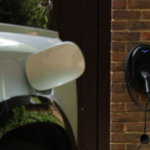
What’s a smart EV charger?
23 September 2024
Kitchen sink carriers: EVs with the biggest boot space
23 September 2024The top ten FAQs about electric cars
As we get used to clean, green, high-performance electric vehicles (EVs), and let go of polluting, outdated internal combustion engines (ICE), a few questions inevitably crop up.
How far can they go? Are there financial incentives? What about home charging?
We’ve mined the internet for the top ten electric vehicle (EV) FAQs and answered them for you.
1. How far can an electric car travel on a single charge?
EV range is the distance an electric or hybrid car can travel before the battery needs to be recharged. And the worry of getting stranded with a flat battery is something many EV drivers (and would-be drivers) often worry about.
In reality, ever-advancing tech means ranges are getting bigger and bigger. Even entry-level cars can easily do the average weekly mileage in the UK (127 miles, since you ask) on a single charge.
A Nissan Leaf e+, for example, has a range of 210 miles. A top-of-the-range Tesla Model S can do a whopping 355 miles.
And because it’s new tech, the market is brimming with innovation. Manufacturers such as Toyota are working on batteries that will have 900 mile plus ranges. That’s enough to drive from London to Milan without stopping. Bellissima.
2. How long does it take to charge an electric car?
The time it takes to charge your EV depends on a few factors, including the charger speed, and the size of your battery.
As a rough guide, you can expect:
- A home EV charger to give you about 30 miles’ range per hour of charging (ideal for charging overnight).
- Standard public chargepoints to give you up to 80 miles’ range per hour.
- Rapid public chargepoints to give you a full charge in under an hour.
- Ultra-rapid chargepoints to give you a full charge in 20-30 minutes.
Bear in mind that not all cars can handle the higher amount of power put out by ultra-rapid chargepoints.
You can read more about the time it takes to charge your EV in our indepth article here.
3. Where can I find public chargepoints?
Public chargepoints are becoming as common as rain in November. They’re all over the UK. You’ll find them in petrol stations, public car parks, supermarket and shopping centre car parks, service stations, office car parks and at train stations.
Zapmap has mapped them all for you; their data shows almost 50,000 public chargepoints in the UK, at almost 30,000 locations.
4. How much does it cost to charge an electric car?
Public chargepoints are good for getting you out of a jam or if you’re on a long-distance trip—but they’re expensive. A typical public charging station can cost 48p per kWh, fully charging a 62 kW Nissan Leaf for about £29.
Charging at home is much more cost-effective (and convenient).
What you’ll pay depends on your tariff, but our 62 kW Nissan Leaf would cost about £17 to fully charge at a standard 32p per kWh tariff.
Not bad, but we can do better.
Get yourself on a low-cost overnight tariff (we’re talking as low as 9p per kWh) and your full battery will only set you back a fiver.
It doesn’t stop there. Go for the ultimate setup—a home EV charger paired with solar panels—and when the sun’s out you’ll be able to charge up for free.
5. What incentives are available for electric car buyers?
Low-cost motoring. High-performance cars. Clean air. As if there weren’t enough reasons to go electric. Yet there are also financial incentives you can benefit from.
UK Government’s Plug-in Grant
If you’re buying a plug-in motorcycle, van, truck, taxi, or mobility vehicle, you can get up to 35% off through this government scheme.
Vehicle tax exemption
Bills, bills, bills. Nobody likes them. If you’ve got an EV, you can feel smug in the knowledge that you’ve got one less to deal with than your diesel or petrol guzzler counterparts: all EVs are exempt from vehicle tax.
Workplace charging grant
Businesses and other organisations can access a grant of up to £14,000 to install chargepoints at their premises. If you’re an employee, let your boss know.
EV charging point grant for renters or apartment owners
Renters and apartment owners, if you’ve got a private parking space you or your landlord can get 75% or £350 off the cost of a new charging point.
Domestic chargepoint grants for Scotland
If you’re an EV driver in Scotland and you live in a remote or rural area, you could get a cool £400 off the price of a home chargepoint. This is also applicable to those who’ve bought a used EV through the Used Electric Vehicle Loan scheme.
6. How does the maintenance of an electric car compare to a traditional ICE vehicle?
Internal combustion engine (ICE) vehicles aren’t just big polluters, they also contain hundreds of moving parts and need more servicing.
Electric cars, on the other hand, have fewer bits. That means they are much easier to maintain. It’s like comparing an antique watch full of cogs and springs with a modern digital one.
The main things to keep an eye on are tyres, the battery, and brakes.
However, when it comes to brakes, regenerative braking means less wear on the pads and discs. So, you won’t need to replace them anywhere near as often.
7. What’s the environmental impact of electric cars?
Electric cars aren’t perfect for the environment but they are much better than fossil fuel-powered alternatives.
The manufacture of electric cars indeed creates a bigger carbon footprint than their petrol and diesel counterparts (because of the battery. These cars pump out polluting emissions every mile they drive. Evs don’t emit anything—they don’t even have an exhaust.
Look at the total carbon footprint of the life of a car, and EVs come out way lower. Check out our How Green are Electric Cars article for all the detail.
8. Can I install an EV charging point at home?
A home EV charger will take your EV ownership experience to the next level. There’ll be no need to factor in trips to the charging station or pay for expensive public chargepoints. Just low cost and high convenience.
To get a home EV charger it’s best if you have private parking, such as a driveway or your own space in a residential car park. The charging point simply hooks into your home or apartment block’s existing electricity system. This is usually a straightforward job for a professional installer.
9. What’s the resale value of electric cars?
EVs are now firmly mainstream and the second-hand market is flourishing. A quick search on Auto Trader shows over 16,000 fully electric cars available to buy.
Most three-year-old cars go for about 60% of their original price. EVs are on a par with that, and in some cases even better.
With low emissions zones, transferrable battery warranties, and highly desirable brands, values are holding up well.
10. Do electric cars work in freezing temperatures?
If you’re worried about your electric car stuttering to a halt as soon as Jack Frost appears, look no further than Norway. In a country where the mercury can hit a toe-numbing -20℃, over half of new car sales are electric.
It’s true, the battery in an EV isn’t as efficient in freezing temperatures. Combine that with a heater on full blast, and you can expect your range to dip by about 10-20%, depending on the car.
Given typical EV ranges are well over the average UK weekly mileage anyway, it’s not a big problem.
There are also a few tricks you can do to maximise your range. These include getting the heater going while you’re still plugged in, ensuring your tyres are at a proper pressure and parking under cover (i.e. like a garage), if possible.
About Powerverse
We’re industry experts in home energy management. Our easy-to-use app is built for your future electric home. It will effortlessly sync your solar, battery, heat pump, EV charger and more, helping you cut costs and your carbon footprint on your way to becoming energy-independent. Curious to know more? Talk to one of our experts.

